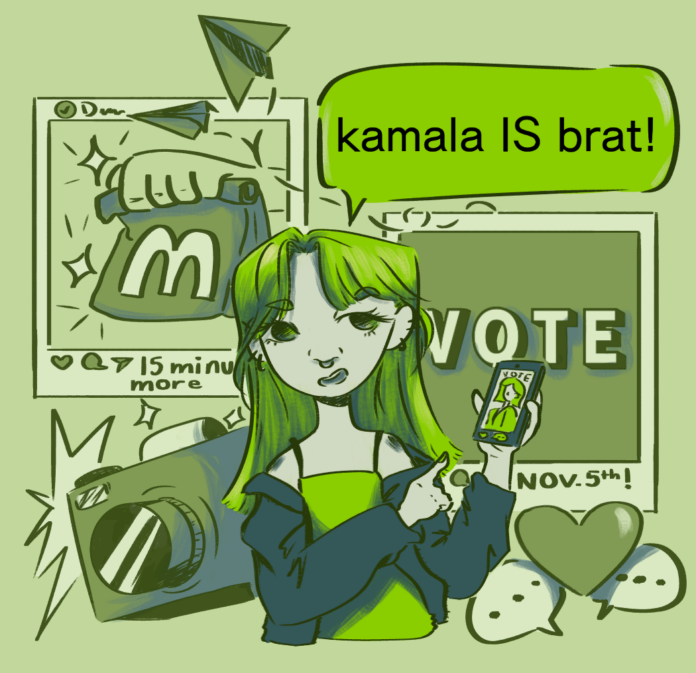Both new and experienced voters make sense of new political landscape
By EMME DUNNING — features@theaggie.org
To say that the 2024 United States presidential election has been unusual would certainly be an understatement. With a Republican candidate facing multiple felony convictions and a Democratic candidate who entered the race mere months ago, a victory for either party would be a historic event.
The candidates for this election have been unique to say the least, and their methods of reaching potential voters has reflected this. The Kamala Harris campaign in particular has used social media trends to appeal to young voters, connecting her image with popular musical artists like Chappell Roan and Charli XCX and capitalizing on relevant TikTok trends. Voters and academics alike are taking note.
Amber Boydstun, a professor of political science and communications at UC Davis, has significant experience analyzing the link between media and politics. In this particular election, Boydstun believes that a lack of policy information could be responsible for the increase in trend-related election content consumers have been seeing on social media.
“We’re in a relatively low-information political environment compared to other elections,” Boydstun said. “I’ve never been alive in an election where we know so little about both candidates’ concrete policy proposals. What [social media trends] have done in this low-information environment is to give people a different heuristic to grab onto.”
In low-information elections such as this one, Boydstun notes that many voters are drawn to candidates based on their personality and personability — particularly in terms of how these things fit in with their personal identity and values.
“When we don’t have information about policies, then we really do go based on vibes,” Boydstun said. “We go based on whether they’re a Republican or a Democrat and what we stereotype those labels with, or whether they are a man or woman or what their race is. At the end of the day, are they someone we’d like to have a beer or a coffee with?”
Boydstun also asserted that although social media has streamlined the process of reaching young constituents, using media to connect to potential voters is an established practice.
“This is nothing new, right?” Boydstun said. “The entertainment space has been a place where presidential candidates have hoped to try to make a personal connection with people, and so it makes sense that social media would be the natural extension of that.”
Andrea Guillen, a fourth-year political science major, has seen this change in outreach tactics first hand.
“Social media has definitely affected the way I see this presidential election,” Guillen said. “[In past elections], a lot of the time they would just hold press conferences, and you’d see it on live TV. Now It’s obvious that they’re trying to reach a specific audience that wouldn’t typically go out of their way to watch a presidential rally or debate.”
Although Guillen understands the important role of social media in politics, she also is acutely aware of the unique dangers it may present.
“Like a lot of people my age, I consume a lot of content on the internet,” Guillen said. “Social media is definitely one of the best ways to keep voters informed, but it can be tricky because misinformation is so easily spread.”
To combat this, she recommends that potential voters continue to do research on candidates and policies outside of social media. To that end, pursuing information about individual candidates’ policies is a crucial part of participating in local and presidential elections.
Megan Van Note, a third-year international relations major, agrees that politicians engaging in social media trends can be a great asset to reaching voters, so long as it is done sensibly.
“I do think that trends tying together candidates or policies can make them relatable and relevant to young adults and can encourage them to vote,” Van Note said. “If done correctly, I think it can really help promote democracy.”
In order to ensure that voters make informed decisions, Van Note encourages young voters to reach beyond social media for election information and content.
“Read, listen and watch different perspectives from different sites,” Van Note said. “By only relying on news channels or social media, you are doing yourself a disservice.”
While social media has proven itself to be a powerful way of reaching young voters, experts and UC Davis students alike assert that it should be coupled with personal reflection and outside research in order to be an effective tool.
Written by: Emme Dunning — features@theaggie.org






